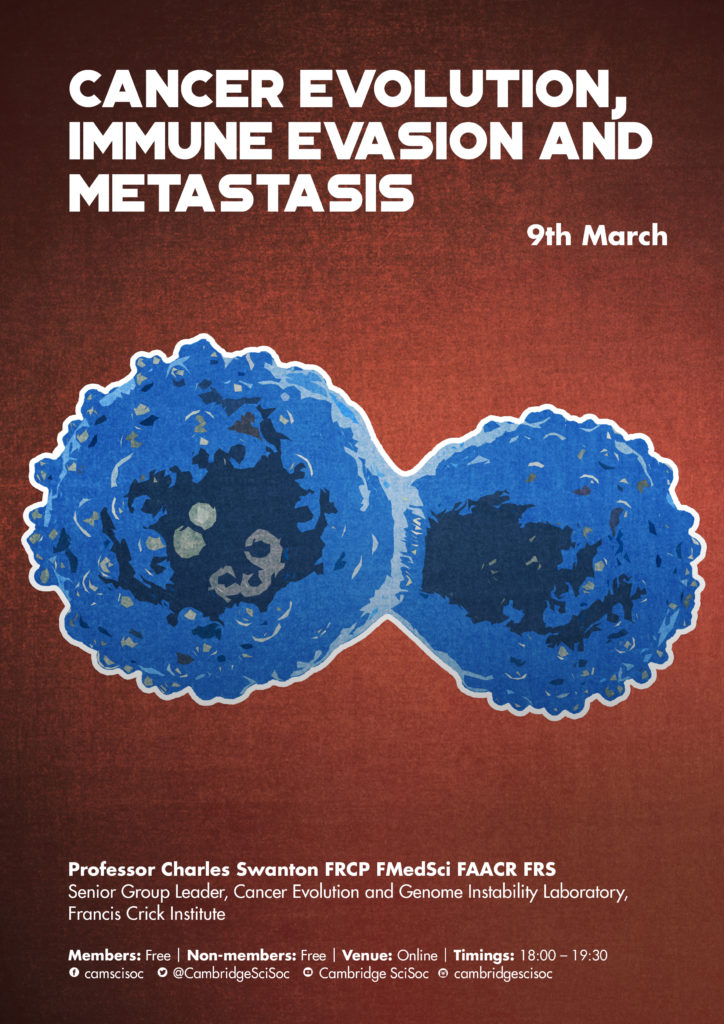
- This event has passed.
Cancer evolution, immune evasion and metastasis – Professor Charles Swanton FRCP FMedSci FAACR FRS
9 March 2021 | 18:00 - 19:30

This talk is open to all regardless of membership.
Register your interest here.
Professor Charles Swanton FRCP FMedSci FAACR FRS
Senior Group Leader, Cancer Evolution and Genome Instability Laboratory, Francis Crick Institute
Charles.Swanton@crick.ac.uk
Abstract
Evidence supports complex subclonal relationships in solid tumours, manifested as intratumour heterogeneity. Parallel evolution of subclones, with distinct somatic events occurring in the same gene, signal transduction pathway or protein complex, suggests constraints to tumour evolution that might be therapeutically exploitable. Data from TRACERx, a longitudinal lung cancer evolution study will be presented. Drivers of tumour heterogeneity change during the disease course and contribute to the temporally distinct origins of lung cancer driver events. APOBEC driven mutagenesis appears to be enriched in subclones in multiple tumour types. Oncogene, tumour suppressor gene and drug-induced DNA replication stress are found to drive APOBEC mutagenesis. Phylogenetic tracking detects minimal residual disease and clonal evolution of disease from primary to metastatic sites, presenting opportunities for drug development.
On-going chromosomal instability, manifested as Mirrored Subclonal Allelic Imbalance (MSAI) is found to be a major driver of intratumour heterogeneity across cancer types, contributing to parallel evolution and selection. Subclonal driver events, evidence of ongoing selection within subclones, combined with genome instability driving cell-to-cell variation is likely to limit the efficacy of targeted monotherapies, suggesting a need for new approaches to drug development and integration of cancer immunotherapeutic approaches. Multiple adaptive mechanisms to neo-antigen evolution have been found in TRACERx highlighting cancer chromosomal instability driving immune evasion and HLA loss and loss of clonal neoantigens as well as epigenetic repression of neo-antigens. The clonal neo-antigenic architecture may act as a tumour vulnerability to mitigate resistance and treatment failure.
Speaker profile
Professor Charles Swanton completed his MD-PhD training in 1999 at the Imperial Cancer Research Fund Laboratories and Cancer Research UK clinician scientist/medical oncology training in 2008. Prof Swanton is a Senior Group Leader of the Cancer Evolution and Genome Instability Laboratory at the Francis Crick Institute and combines his research with clinical duties at UCLH, as a thoracic oncologist, focussed on how tumours evolve over space and time. Prof Swanton is the Chief Investigator of TRACERx, a lung cancer evolutionary study and the national PEACE autopsy program. Prof Swanton was appointed Fellow of the Academy of Medical Sciences in 2015, awarded the Napier Professor in Cancer by the Royal Society in 2016, appointed Cancer Research UK’s Chief Clinician in 2017, and elected Fellow of the Royal Society in 2018 and Fellow of the Academy of American Association for Cancer Research in 2020. In 2016, he co-founded Achilles Therapeutics, a UCL/CRUK/Francis Crick Institute spin-out company, assessing the efficacy of T cells targeting clonal neoantigens. Most recently, Prof Swanton was awarded the ESMO Award for Translational Cancer Research (2019) and the Addario Lung Cancer Foundation Award and Lectureship at the International Lung Cancer Congress (July 2020).
